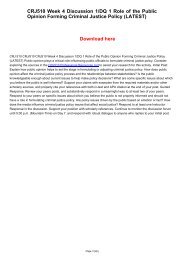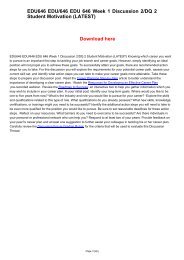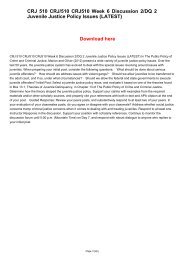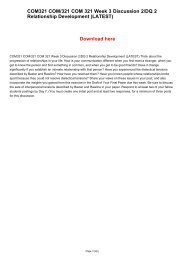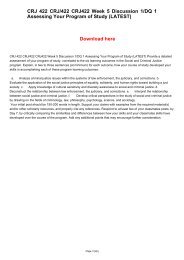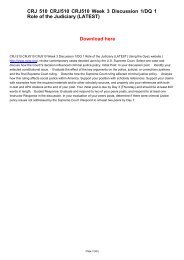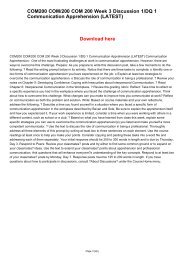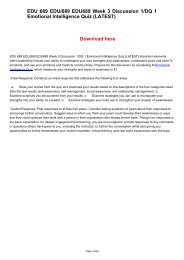CRJ 510 CRJ510 Week 4 Discussion 2DQ 2 Interest Groups Influence in Policy Formulation (LATEST)
- TAGS
- formulation
Create successful ePaper yourself
Turn your PDF publications into a flip-book with our unique Google optimized e-Paper software.
<strong>CRJ</strong> <strong>510</strong> <strong>CRJ</strong>/<strong>510</strong> <strong>Week</strong> 4 <strong>Discussion</strong> 2/DQ 2 <strong>Interest</strong><br />
<strong>Groups</strong> <strong>Influence</strong> <strong>in</strong> <strong>Policy</strong> <strong>Formulation</strong> (<strong>LATEST</strong>)<br />
Download here<br />
<strong>CRJ</strong><strong>510</strong> <strong>CRJ</strong> <strong>510</strong> <strong>CRJ</strong>/<strong>510</strong> <strong>Week</strong> 4 <strong>Discussion</strong> 2/DQ 2 <strong>Interest</strong> <strong>Groups</strong> <strong>Influence</strong> <strong>in</strong> <strong>Policy</strong> <strong>Formulation</strong> (<strong>LATEST</strong>)<br />
Marion and Oliver def<strong>in</strong>e <strong>in</strong>terest groups as pressure group, special <strong>in</strong>terest, organized <strong>in</strong>terest, of faction, as a group of<br />
citizens who are organized and attempt to <strong>in</strong>fluence legislation so it reflects their <strong>in</strong>terest or policy goals. (p.281).<br />
Consider explor<strong>in</strong>g the sources <strong>in</strong> the <strong>CRJ</strong><strong>510</strong> Professional Resources List to assist your research for this activity. Initial<br />
Post: Read the Lutze and Schaefer article and use it as a spr<strong>in</strong>gboard for this discussion. Re-entry and rehabilitation<br />
programs are controversial and have proponents on both sides of the issues. Expla<strong>in</strong> the role special <strong>in</strong>terest groups<br />
play <strong>in</strong> their effort to <strong>in</strong>fluence legislation that dictates re-entry and rehabilitation policy. Then from a macro perspective,<br />
should there be so many access po<strong>in</strong>ts that allow special <strong>in</strong>terest groups to access legislators? What are the negatives<br />
to allow<strong>in</strong>g special <strong>in</strong>terest groups to have an active role <strong>in</strong> political campaigns? Support your claims with examples from<br />
the required materials and/or other scholarly sources, and properly cite your references with both <strong>in</strong>-text and APA<br />
citations at the end of your post. Guided Response: Review your peers posts, and substantively respond <strong>in</strong> a<br />
mean<strong>in</strong>gful way to at least two of your peers. You may look at this from the perspective of reentry and rehabilitation or<br />
from a more macro perspective. Take a contrarian view from your peers, and present different perspectives on the role<br />
of special <strong>in</strong>terest groups <strong>in</strong> their effort to <strong>in</strong>fluence the formulation of crim<strong>in</strong>al justice policy. What are the positives to<br />
rely<strong>in</strong>g on special <strong>in</strong>terest groups to actively <strong>in</strong>fluence the formulation of crim<strong>in</strong>al justice policy? How do special <strong>in</strong>terest<br />
groups <strong>in</strong>fluence crim<strong>in</strong>al justice policy <strong>in</strong> an effort to adjust social justice issues? Support your position with scholarly<br />
references. Respond to at least one Instructor Response <strong>in</strong> the discussion. Cont<strong>in</strong>ue to monitor the discussion forum<br />
until 5:00 p.m. (Mounta<strong>in</strong> Time) on Day 7, and respond with robust dialogue to anyone who replies to your <strong>in</strong>itial post.<br />
Page 1/{nb}



